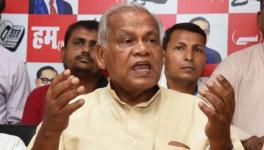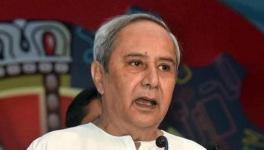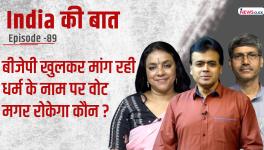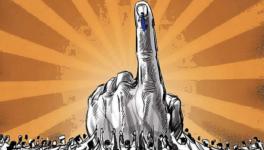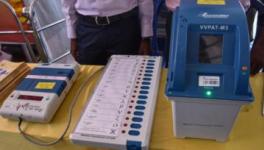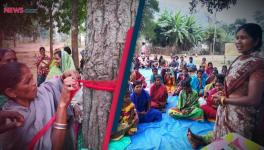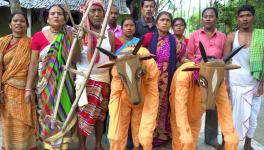Mumbai Collective - An Appeal to the People of India
“Kerala, at the beginning of the nineteenth century not only had untouchability but also -- un-see-ability”, eminent economist Prabhat Patnaik reminded a packed audience of predominantly young women and men. A dalit person was forced to wear bells to forewarn an upper caste carriage, to slow down so that she could hide and the ‘twiceborn’ could pass unpolluted by her very sight. From that to what Kerala has come to be, has been “India’s Long Revolution.”
“What we are seeing today is a social counter-revolution”, warned Patnaik referring to the present atmosphere under the former RSS pracharak, Prime Minister Narendra Modi. “It is an effort to undo -- in stages -- major achievements like equality before law and universal adult suffrage”
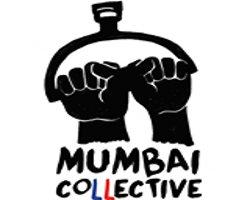
Image Courtesy: Mumbai Collective
Against the backdrop of the Jawaharlal Nehru University Student Union (JNUSU) crackdown and the Rohit Vemula suicide, people from across the financial metropolis of Mumbai gathered at the Y.B. Chavan Centre in Nariman Point to discuss the worrying turn that the country is on. Journalists and political activists from across the city along with teachers and students from the Tata Institute of Social Sciences (TISS), Indian Institute of Technology (IIT) Mumbai and other educational institutes, organised themselves as the “Mumbai Collective” and congregated on March 5th and 6th to voice common concerns. Prof. Ramakumar (TISS), lead organiser of the Mumbai Collective cited the recent historic speech by JNUSU president Kanhaiya Kumar and extolled his Azadi Anthem as an agenda setter for “all forward looking progressive people”.
Speakers from various walks of life addressed an audience of nearly a thousand people over two full days of discussions panels, Q&A and some awe-inspiring music. Historians, scientists, activists, journalists, lawyers, politicians, artists, photographers, poets, litterateurs, film-makers and actors -- even Bollywood celebrities -- expressed solidarity with each other while they recounted how they were being institutionally, and at times personally, attacked by a government with a very specific political agenda and very little tolerance for dissent. On display were art exhibitions like “Art against Fascism” by Sunil Chopra , “Awaaz Do, a call for resistance” and ”Assault on Reason” by the Delhi-based SAHMAT.
Academics including scientists, mathematicians and historians, enumerated instance after instance of what appeared like a sedulous campaign against the nation’s premier research institutions with an intention to undermine scientific inquiry in favor of mythology and unreason. Renowned historian of Early India, Prof. K. M. Shrimali gave the example of the appointment of Sudershan Rao as the head of the Indian Council of Historical Research (ICHR) in close succession with the swearing-in of the government. Sudershan Rao has made it clear through his interviews that the very field of History, as it is currently understood in academia, is redundant in the presence of such religious texts such as the great Hindu epics Ramayana and Mahabharata. D. Balagangadhar, keynote speaker at the prestigious 7th Maulana Azad Memorial Lecture invited by ICHR, presumably echoed Rao’s sentiment when he proclaimed History to be “a fetish".
Prof. M. S. Raghunathan, Distinguished Guest Professor of Mathematics, IIT Mumbai lamented the growing interference of different kinds, in the autonomous working of universities. He cited the example of Prof. R. K Shevgaonkar, former director of IIT Delhi who was “shunted away”. D. Balasubramanian, chairperson of the Panel on Ethics of the Inter-Academies of Sciences and Former Director, Centre for Cellular and Molecular Biology (CCMB), reminded the audience that India was the only one of the more than sixty anti-colonial nations of the post-World War II era that had committed itself to a path of Science & Technology for national good on independence. “India was the only one that decided that the growth, development and welfare of its people rests solidly [in our ability to make] friends with Science”, said Prof. Balasubramanian. He joined Prof. Shrimali and Prof. Raghunathan by alluding to Buddha and Tagore demonstrating that Indian tradition also has articulations of scientific inquiry, critical and independent thought. However he contrasted this with obscurantist leaps of imagination that can be found in Prime Minister’s notorious claims that Hindu deity Ganesha’s trunk is evidence ancient plastic surgery or his claims that the episode of birth of Karna in Mahabharat is evidence of ancient Indian genetic science, or even that of the notorious paper “picked” by the ISCA to be presented at the 103rd Indian Science Congress that proclaimed Lord Shiva to be the “world’s greatest environmentalist”. 115 scientists had written a letter to the Prime Minister on behalf of the scientific community condemning these developments.
Megha Pansare, daughter-in-law of slain rationalist lawyer and former Maharashtra state secretary of the Communist Party of India, Comrade Govind Pansare shared the panel with Hamid Dabholkar, son of anti-superstition activist founder of Andhashraddha Nirmoolan Samiti, Narendra Dabholkar who was also murdered by allegedly right wing terrorists. Both Ms. Pansare and Mr. Dabholkar expressed disappointment and anger over the apparent neglect of the investigation proceedings in both cases. They condemned the insult that Maharashtra Police dealt to the memory of the famous rationalist Dabholkar when one of its top officers sought investigative leads through a planchet which was later publicly telecast.
The defunding of research, wrongful appointments and invitations, public statements that conflate science & history with fiction & mythology and a culture impunity for killers of rationalists were observed by the panel as a larger pattern in the deliberate “Assault on Reason”. Prof. Balasubramanian cited the example of the defunding of Council of Scientific and Industrial Research (CSIR) as an example of a systematic assault on Science. The CSIR labs, some of which were established before Independence will not be funded by the government anymore. National Nutritional Monitoring Bureau (NNMB), a body that did pioneering research on calorific values of Indian food, has been “chopped off”. “Chopping off CSIR, NNMB and the more recent, cancelling research scholarship of Phd. students are crimes against Reason!”, rued the professor.
Film-maker Kabir Khan, documentarian Anand Patwardhan and photographer Ram Rahman talked of the increasingly frequent experiences with hecklers, censorship, intimidation, violence and more recently, trolls. Kabir Khan retold the amusing tale of the controversy surrounding the name of the blockbuster, “Bajrangi Bhaijan” and the communal, albeit irrational underpinnings thereof. Anand Patwardhan whilst relating his constant encounters with bans and vicious opposition especially to his remarkable exposé of Saffron Terror, “Ram ke Naam (In the name of God)” expressed an urgent need for the alliance of Dalit movements with the Left whilst showcasing clips from his celebrated work, “Jai Bhim Comrade”. He also advised that progressives should not let the Right rule the terms of the debate. “Ask the one question, ‘Who killed Mahatma Gandhi?’ to push them on back-foot”, said Patwardhan.
Prakash Ambedkar (Bharip Bahujan Mahasangh), Chaman Lal (retd. Professor, JNU) and Com. Ashok Dhawale of the Communist Party of India (Marxist) condemned “Hindutva’s Appropriation of Icons”. Com. Dhawale insisted that, “The ideological project of Hindutva necessitates glorification of blatantly communal figures like Hegdewar, Golwalkar, Savarkar and Nathuram Godse on the one hand but It also requires the indefensible appropriation of secular icons like Shivaji, Dr. Ambedkar, Bhagat Singh and not the least -- Swami Vivekanand. This is to expand the Hindutva base”. Dhawale quoted a particularly ominous excerpt from the notorious treatise on Hindutva’s definition of the Hindu Rashtra, “We or Our Nationhood Defined” by RSS ideologue Guru M. S. Golwalkar, “Only those movements are truly national as aim at rebuilding, revitalising and emancipating from its present stupor, the Hindu nation. Those only are nationalist patriots who, with the aspirations to glorify the Hindu race and nation next to their heart, are prompted into and strive to achieve that goal. All others are either traitors and enemies to the national cause, or to take a charitable view, idiots."
Prakash Ambedkar reiterated that the appropriation of Dr. Babasaheb Ambedkar, the framer of the Indian constitution and inciter of “Annihilation of Caste” was central to RSS’s agenda. Ambedkar, Dhawale and Lal provided copious evidence and citations to prove how different the historical figures of Dr. Ambedkar, Bhagat Singh and Shivaji were from the distorted caricatures that the RSS is trying to make of them. Chaman Lal on a humorous note sympathised with the RSS’s hijack of icons because “They don’t have any!”
The winds of irrationality and distortion not only storm academic institutions, scholarship, film and popular iconography but have also engulfed the nation’s media. Pre-eminent journalists critically analysed the present state of the media and claimed that the election of the present government to power in fact marked a metaphorical -- and at times literal -- private treaties between business houses and rapidly consolidating media monopolies. Veteran journalist Geeta Sheshu lamented the lack of accountability of the media and the toothlessness of its self-regulatory bodies. P Sainath remarked that of the “four estates”, media is the only one that is profit seeking. The media is also constituted by “a very small incestuous inner circle” observed Sainath that is in stark contrast to the vastly diverse Indian society. Nikhil Wagle, who has in the past been near-fatally beaten up on numerous occasions by right-wing ruffians, narrated the incidents of censorship and memos at TV news stations that made it clear to senior editors like him that what was expected was a towing of line, not just as the TV anchor but also in private capacity on social media. Pioneering media executive Sashi Kumar of Asianet sees this as a defining moment in the nation’s media where the sections of the media are increasingly acting as propaganda arms.
In addition to academia and media, even the very idea of Indian Nationalism appears to be under the ominous shadow of unreason. N. Ram, chairperson of Kasturi & Sons characterises this as “deliberate, mischievous attempts” of perpetuating an irrational dichotomy of National vs Anti-national. Ram asked what could be more anti-national than the very idea of a Hindu Rashtra? Prof. Gopal Guru of JNU appealed for inwardly contemplative, pluralist, “reasonable” theory of nationalism. Prof. Guru postulated that an outward looking, “patented” form of “unreasonable nationalism” that focuses on the nation’s territorial borders will invariably lead to borders and divisions within the nation, creating “second class citizens” out of religious minorities and “citizens in exile” like Dalits. He further cautioned that Indians do not have a choice outside of nationalism. Instead we need to be able to frame a theory of nationalism that is tolerant of a citizen’s right to complaint, committed to a pluralist core and solidly rooted in Reason.
Prabhat Patnaik examined this epidemic of Unreason that appears to have state sanction and certainly has the RSS as its intellectual source. “If you kill multiplicity of views, as is going on in our society, you are ushering in a process of destruction of thought, with three serious consequences. Firstly, if we become thoughtless, we become parasitic on advanced nations which then acquire hegemony over your minds. Secondly, destruction of thought is inimical to the changing and in fact is an endorsement of the status-quo. Thirdly, Thought once destroyed one can then put pebbles in people’s minds in the name of communalism and such divisive tendencies”. Prof. Patnaik argues that the deliberate attempt at sowing Unreason is part of the reprisal against India’s long social revolution by those who benefited from the millennia of institutionalised inequality embedded in the caste system. This saffron agenda thus ostensibly against religious minorities is in fact a strategy of reasserting traditional, patriarchal, caste hegemonies over the majority of the country’s population, argued Subhashini Ali of the All India Democratic Women’s Association (AIDWA).
Alongside worry and anger though, there was also poetry of strength and hope. Actors Nandita Das, Swara Bhaskar and Zeeshan Ayub comforted the audience by reading excerpts from Manto, Pash and other great writers & poets. The powerful Vidrohi Shahir Jalsa of the inimitable Sheetal Sathe & troupe and Sambhaji Bhagat sang powerful folk ballads of the Shahir tradition of Maharashtra.
Legislators also came out in solidarity and assured the audience that the struggle shall be fought unitedly against forces of Right reaction by all forward looking people who shall defend the secular, socialist and democratic Constitution of India. Jitendra Awhad of the NCP and Kapil Patil, representative of the Teacher’s Constituency condemned the brahminical revanche against the constitution and promised full support and solidarity with democratic constitutional forces. D Raja, National Secretary of the Communist Party of India insisted that beyond mere intolerance, India is facing the threat of fascism, but expressed confidence that the people of the country shall fight back and ultimately safeguard their rights enshrined in the democratic constitution. Reaffirming his trust in the youth of this country, he was proud as he chuckled that he was now known across the country as “Aparajita’s father”. Sitaram Yechury, General Secretary of the CPI(M) declared that youngsters, like JNUSU President Kanhaiya Kumar were “soldiers of democracy, secularism and other constitutional safeguards”. He called for a popular resistance where everyone joins in the battle of ideas, alongside political resistance against this “right-wing insurrection against India’s democratic secular constitution”.
In the words of Irfan Habib, “All those who have regards for the unity and integration of the nation should see the threat that the RSS’s dominant political position poses to our nation today. Our final court of appeal are the people of India. [Mumbai Collective] is an effort to reach them“
Get the latest reports & analysis with people's perspective on Protests, movements & deep analytical videos, discussions of the current affairs in your Telegram app. Subscribe to NewsClick's Telegram channel & get Real-Time updates on stories, as they get published on our website.









